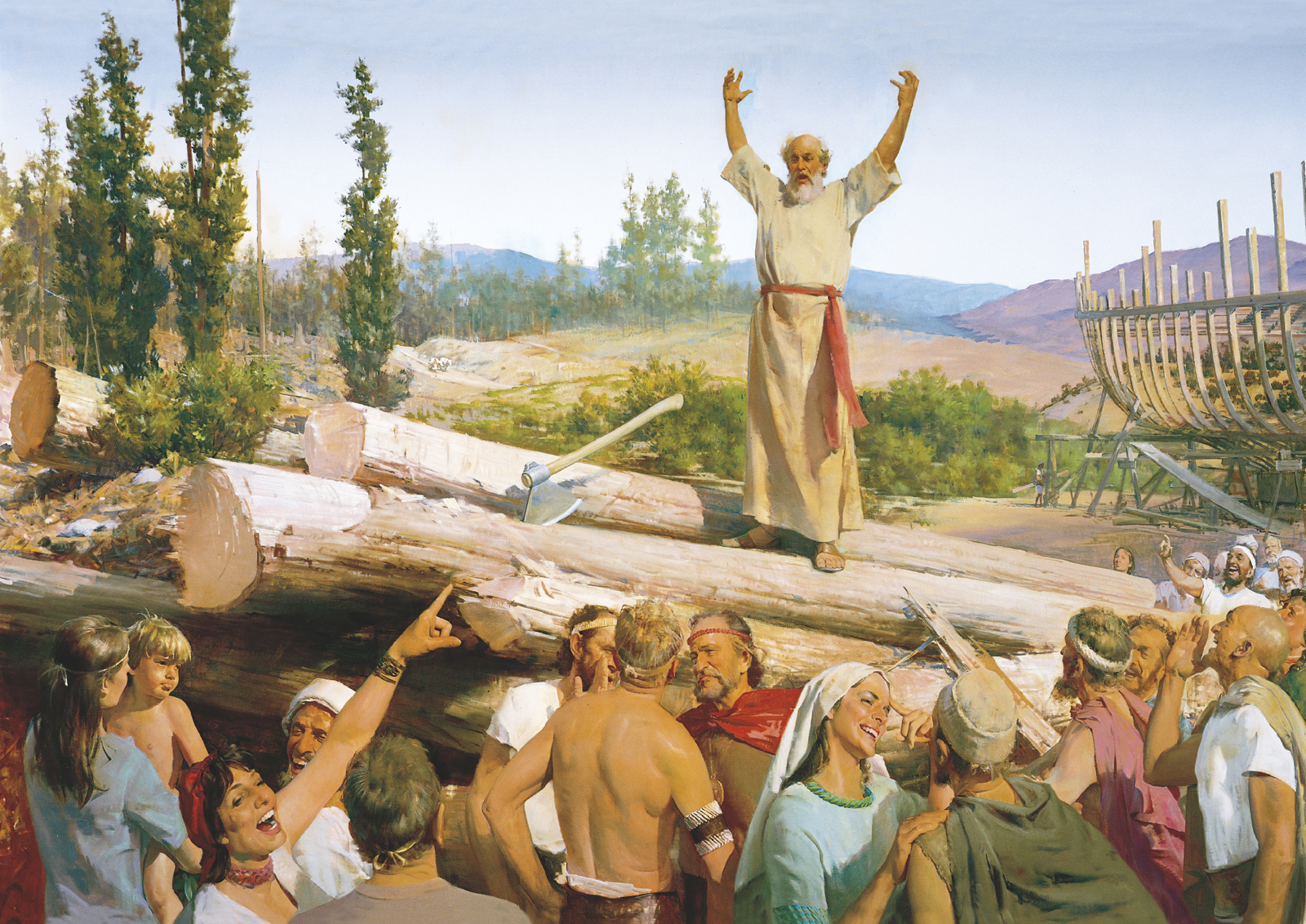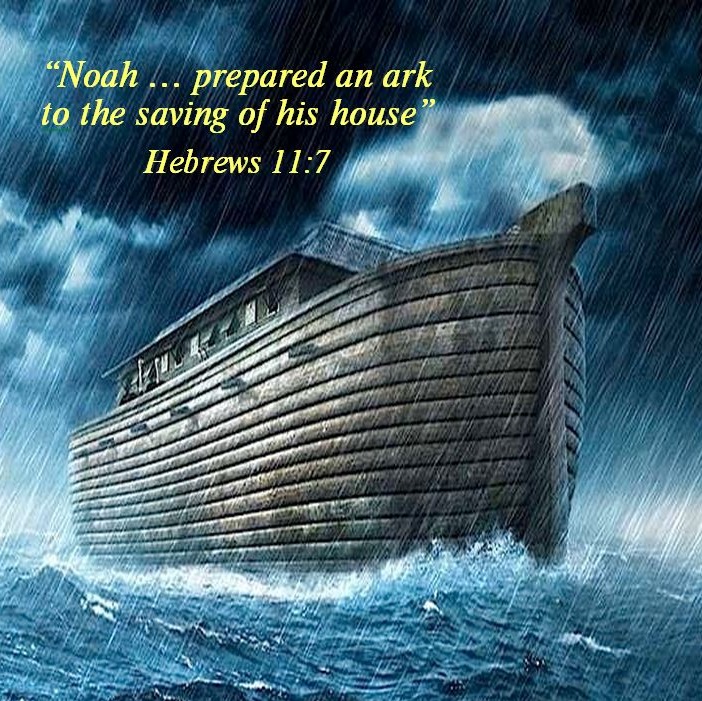We live in a day when wickedness covers the earth. Eventually, as it was cleansed by water, the earth will be cleansed by fire, which will take place at the Savior’s Second Coming (see D&C 5:19 ). Noah’s salvation came by obeying the Lord’s commandments and building an ark that allowed him and his family to survive God’s judgments. Like Noah and his family, we need to repent and be obedient to the Lord in order to be saved from wickedness.

Moses 8:22 God saw the wickedness of men had become great in the earth
“These people were so wicked that they were no longer allowed to pollute the earth by their presence on it or to bring innocent spirits into its decadent environment. The Lord decreed that all living things would be destroyed by flood, with the exception of a faithful few who would be spared so that God could begin anew his creative work and reestablish his covenant among men.
“The Flood was an act of mercy, not an act of vengeance. The generation of Noah was so wicked that only an act of cleansing of immense magnitude could allow the next generations a chance to live by higher principles. As will be necessary at the second coming of Christ, evil must be eliminated, whether it be through repentance or through destruction.” (Kent P. Jackson, “An Age of Contrasts: From Adam to Abraham,” Ensign, Feb. 1986, 29)
Moses 8:23-24 Noah calls on the people to repent
‘A prophet—Noah himself—was raised up and sent forth to preach a warning message to the children of men. Moses 8:23-24 What was his warning? That the world was about to be deluged. Its sins had cried unto heaven, and God had remembered its iniquities. He was about to baptize the earth in water, to wash away its sins, that they should no longer smoke to heaven, an offering of wrath to an offended God. Noah preached this warning, and, as usual, was met with ridicule and scorn. Never did a prophet come forth that was not ridiculed and persecuted, and the message that he proclaimed considered foolishness by the wisdom of the world. But how did it result? Did the superior (?) wisdom of the world in that day save them from the truth of the words of Noah? Or did God stand by that prophet? Did He make good His words? Did He drown the world? Did He sweep the wicked from its surface? History will tell you what took place. It sees that Noah and the few souls that clung to him were right, and the world at large were in the wrong. Noah had really received a revelation from God. He was pointed at, despised and derided, doubtless called visionary and fanatic, an old fool, or anything else; but he had received a revelation and God made good the words which he proclaimed.’ (Orson F Whitney, Journal of Discourses)
2. The Lord cleanses the earth with a flood.Genesis 7:23 And every living substance was destroyed
“We all need to build a personal ark, to fortify ourselves against this rising tide of evil, to protect ourselves and our families against the floodwaters of iniquity around us. And we shouldn’t wait until it starts raining, but prepare in advance. This has been the message of all the prophets in this dispensation… as well as the prophets of old. “Unfortunately we don’t always heed the clear warnings of our prophets. We coast complacently along until calamity strikes, and then we panic. “When it starts raining, it is too late to begin building the ark. However, we do need to listen to the Lord’s spokesmen. We need to calmly continue to move ahead and to prepare for what will surely come. We need not panic or fear, for if we are prepared, spiritually and temporally, we and our families will survive any flood. Our arks will float on a sea of faith if our works have been steadily and surely preparing for the future.” (W. Don Ladd, “Make Thee an Ark,” Ensign, Nov. 1994, 29) Genesis 8:11 The olive leaf
“Since early biblical times and the early history of mankind, the olive leaf has symbolized peace and has heralded new life and hope.” (Monte S. Nyman and Charles D. Tate, Jr., eds., Jacob through Words of Mormon: To Learn with Joy [Provo: BYU Religious Studies Center, 1990], 88.)
Genesis 8:20 I establish my covenant with you
‘We too have entered into sacred covenants with the Lord that we might be preserved from the adversary. Just as in Noah’s time, we live in a day of prophetic promise and fulfillment. In the past eight years, 71 new temples have been dedicated—a feat, under the direction of the Lord’s prophet, which may in some ways be like the building of the ark in Noah’s day.’ (Paul E Koelliker, General Conference, October 2005)
3. The people build the tower of Babel.
Genesis 8:11 The olive leaf
“Since early biblical times and the early history of mankind, the olive leaf has symbolized peace and has heralded new life and hope.” (Monte S. Nyman and Charles D. Tate, Jr., eds., Jacob through Words of Mormon: To Learn with Joy [Provo: BYU Religious Studies Center, 1990], 88.)
Genesis 8:20 I establish my covenant with you
‘We too have entered into sacred covenants with the Lord that we might be preserved from the adversary. Just as in Noah’s time, we live in a day of prophetic promise and fulfillment. In the past eight years, 71 new temples have been dedicated—a feat, under the direction of the Lord’s prophet, which may in some ways be like the building of the ark in Noah’s day.’ (Paul E Koelliker, General Conference, October 2005)
3. The people build the tower of Babel.
‘In addition to providing an explanation for the numerous languages now found on the earth, this account of the tower of Babel shows how quickly man forgot the lessons of the Flood and turned again from the Lord. The Book of Mormon shows that the actual confounding of the languages may not have been an instantaneous thing but may have happened over an unknown length of time. Jared asked his brother to call upon the Lord and request that their language not be confounded. This request was granted. Then Jared asked his brother to plead that the language of their friends stay the same as theirs. This request, too, was granted. (See Ether 1:33–38.) These events imply that the confounding of the languages did not happen in an instant. (For more information on the tower of Babel, see Bible Dictionary, s.v. “Babel.”)’ (Institute Old Testament Manual)

“The Akkadian or Babylonian word babel means ‘gate of God.’ The word translates from Hebrew into English as ‘confusion’ or ‘confound’-hence Moses’ text, ‘Therefore is the name of it called Babel; because the Lord did there confound the language of all the earth’ (Gen. 11:9).For some in the modern world, the historicity of the tower of Babel story, as with the Flood, is often discounted. One modern school of thought considers the account to be nothing more than an ‘artful parable’ and an ‘old tale.’ But Latter-day Saints accept the story as it is presented in Genesis. Further, we have the second witness of the Book of Mormon. The title page of the Book of Mormon explains that the book of Ether ‘is a record of the people of Jared, who were scattered at the time the Lord confounded the language of the people, when they were building a tower to get to heaven.’ The book of Ether itself then tells of when ‘Jared came forth with his brother and their families, with some others and their families, from the great tower, at the time the Lord confounded the language of the people, and swore in his wrath that they should be scattered upon all the face of the earth’ (Ether 1:33). (Donald W. Parry, “The Flood and the Tower of Babel,” Ensign, Jan 1998, 35)
Advertisements Share this:




